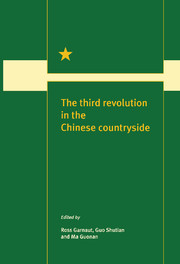Book contents
- Frontmatter
- Contents
- Figures
- Maps
- Tables
- Contributors
- Preface
- 1 The third revolution
- Feeding the people
- Marketing and price reform
- 6 Price reform for agricultural products
- 7 Grain marketing: from plan to market
- 8 Fertiliser price
- 9 Agricultural wholesale markets
- 10 The ‘wool war’ and the ‘cotton chaos’: fibre marketing
- 11 Conflict over cabbages: the reform of wholesale marketing
- Internationalisation
- Regional issues
- Institutional change
- References
- Index
11 - Conflict over cabbages: the reform of wholesale marketing
from Marketing and price reform
Published online by Cambridge University Press: 04 August 2010
- Frontmatter
- Contents
- Figures
- Maps
- Tables
- Contributors
- Preface
- 1 The third revolution
- Feeding the people
- Marketing and price reform
- 6 Price reform for agricultural products
- 7 Grain marketing: from plan to market
- 8 Fertiliser price
- 9 Agricultural wholesale markets
- 10 The ‘wool war’ and the ‘cotton chaos’: fibre marketing
- 11 Conflict over cabbages: the reform of wholesale marketing
- Internationalisation
- Regional issues
- Institutional change
- References
- Index
Summary
Rapid economic growth brings about significant changes in opportunity costs, generating a need for a new balance between economic sectors. Rebalancing in turn entails a cascading sequence of change in a whole range of social relations, institutions and technology. The interplay between economic growth and further economic reform is thus crucial to the next phase of China's development. The evidence suggests that the economic forces at work cannot be halted or reversed. A study of the ‘struggle’ to deliver the humble Chinese cabbage to the dinner tables of China's urban residents provides insights into the nature of China's reform process, the forces driving the reform agenda, and how China's economy is changing.
The reform period since 1978 has seen changes in the pattern of demand and in the organisation and location of production, the growth of new regional linkages, reform of the marketing system, a general trend towards higher prices, and problems caused by inflationary effects and burgeoning government subsidies. These changes have had important consequences for economic and political organisation and for the technical aspects of production, infrastructure and marketing. Producers need new inputs, more services and more information. Institutional systems originally geared towards local self-sufficiency now have to play a role in regional interdependency. The institutional boundaries between production, transport, wholesale and retail which form obstacles to an integrated marketing network have to be swept aside. New mechanisms need to be found to handle the competing interests of producers, consumers, different urban administrations and different ministerial systems.
- Type
- Chapter
- Information
- The Third Revolution in the Chinese Countryside , pp. 144 - 163Publisher: Cambridge University PressPrint publication year: 1996
- 3
- Cited by

